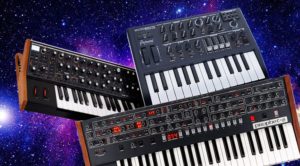 Who doesn’t love hearing unique sounds? Music lovers and those who create it spend a lot of time trying to put different sounds together to make them flow and sound great. This enables the random sounds to become a song. A synthesizer makes it more possible and most are simple electronic musical instruments that convert sound through amplifiers, speakers, or headphones.
Who doesn’t love hearing unique sounds? Music lovers and those who create it spend a lot of time trying to put different sounds together to make them flow and sound great. This enables the random sounds to become a song. A synthesizer makes it more possible and most are simple electronic musical instruments that convert sound through amplifiers, speakers, or headphones.
What is a Synthesizer?
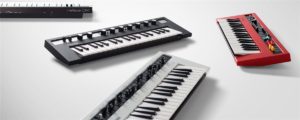 A synthesizer is designed to imitate certain sounds. For instance, they may imitate a piano, an organ, a flute, or other instruments. They may also allow you to play music that sounds like ocean waves or other “natural” sounds. This is why you will see them frequently used along with a keyboard, but in the professional world, they may be used along with other input devices. They can work well with fingerboards, electric drums, and more. These devices have been popular in music since the 1960s when they were used in pop songs and then in disco songs of the 70s their popularity further increased. By the 80s, all musicians wanted the very best that money could buy.
A synthesizer is designed to imitate certain sounds. For instance, they may imitate a piano, an organ, a flute, or other instruments. They may also allow you to play music that sounds like ocean waves or other “natural” sounds. This is why you will see them frequently used along with a keyboard, but in the professional world, they may be used along with other input devices. They can work well with fingerboards, electric drums, and more. These devices have been popular in music since the 1960s when they were used in pop songs and then in disco songs of the 70s their popularity further increased. By the 80s, all musicians wanted the very best that money could buy.
Why Have a Synthesizer?
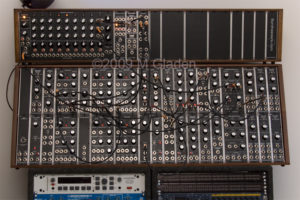 Virtually every musical instrument can benefit from a synthesizer. They enhance the sounds that come out of the instruments. However, guitarists especially love having them. They like using them because of the way that it changes the sound that comes from their guitar. It gives new life to the same ole sounds that you are used to hearing. It also makes it easier for guitarists in a band to keep up with multiple parts or sounds at one time, which in turn ensures that you are performing the best that you can. More than anything though, synthesizers allow you to sync everything at one time. Many of them use MIDI, which allows you to change sounds by twisting knobs and sync what you are doing to other types of instruments. Most of the time, this does require a computer that has a music software program installed.
Virtually every musical instrument can benefit from a synthesizer. They enhance the sounds that come out of the instruments. However, guitarists especially love having them. They like using them because of the way that it changes the sound that comes from their guitar. It gives new life to the same ole sounds that you are used to hearing. It also makes it easier for guitarists in a band to keep up with multiple parts or sounds at one time, which in turn ensures that you are performing the best that you can. More than anything though, synthesizers allow you to sync everything at one time. Many of them use MIDI, which allows you to change sounds by twisting knobs and sync what you are doing to other types of instruments. Most of the time, this does require a computer that has a music software program installed.
What to Consider When Buying a Synthesizer
When buying your first synthesizer, you want to make a good choice for what you are hoping to do with it. This may require you to spend a little time exploring your options. This is because there is a lot of information out there and it can seem overwhelming. You will have to know what you want as far as the polyphony or voices that it has, whether you want analog or digital, the price, whether it has MIDI implementation, the memory that it has available, whether you want drum sounds, and then you get into other features that may be useful. Do you want the Moog Sound that many musicians want from their synthesizer? It is the most popular starter one available. There are also synthesizers that make classic sound with more modern reliability. These may also create a more organic sound that you find appealing. These luckily also have a very modest price on them, unlike some others. You should take into careful consideration the price that you are willing to pay, especially for your first, since there is a good chance that you will find a reason to upgrade fairly quick.
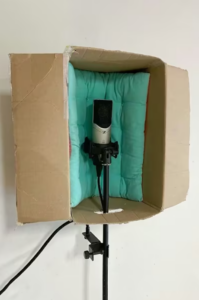 Microphones are another cornerstone of any music studio. A good selection usually includes a large-diaphragm condenser mic for vocals, dynamic mics for louder sources like drums or guitar amps, and possibly ribbon mics for a warmer, vintage tone. Each type of microphone has its strengths, and choosing the right one for your recording purposes will elevate the clarity and character of your tracks. Equally important is a midi controller or keyboard, which allows you to input notes, control virtual instruments, and compose more intuitively. For musicians who play live instruments, quality instrument cables and microphone stands keep the setup clean, stable, and dependable.
Microphones are another cornerstone of any music studio. A good selection usually includes a large-diaphragm condenser mic for vocals, dynamic mics for louder sources like drums or guitar amps, and possibly ribbon mics for a warmer, vintage tone. Each type of microphone has its strengths, and choosing the right one for your recording purposes will elevate the clarity and character of your tracks. Equally important is a midi controller or keyboard, which allows you to input notes, control virtual instruments, and compose more intuitively. For musicians who play live instruments, quality instrument cables and microphone stands keep the setup clean, stable, and dependable.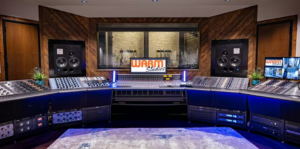
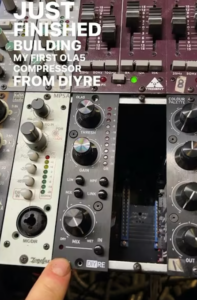 Cabling and power management are equally important: investing in shielded cables reduces interference, while power conditioners protect your equipment from surges and electrical noise. Comfortable, ergonomic furniture like an adjustable chair and a sturdy desk also make long sessions more productive and less fatiguing. And let’s not forget backup storage either—external drives or cloud solutions ensure your projects are safe in case of hardware failure.
Cabling and power management are equally important: investing in shielded cables reduces interference, while power conditioners protect your equipment from surges and electrical noise. Comfortable, ergonomic furniture like an adjustable chair and a sturdy desk also make long sessions more productive and less fatiguing. And let’s not forget backup storage either—external drives or cloud solutions ensure your projects are safe in case of hardware failure.


 Not all performances take place inside an auditorium where the acoustics are perfect and there is ample power for all that you need to power up. There are some that are in outdoor areas where no power at all is provided for the synthesizers, lighting, and more. What do you do in this case if you are a performer or a DJ? Powering through outdoor gigs can be a major complication, but it is one that is possible.
Not all performances take place inside an auditorium where the acoustics are perfect and there is ample power for all that you need to power up. There are some that are in outdoor areas where no power at all is provided for the synthesizers, lighting, and more. What do you do in this case if you are a performer or a DJ? Powering through outdoor gigs can be a major complication, but it is one that is possible. Anytime you have a stage set up outside, there are things you must prepare for. For instance, you should have a covered stage in the event of a sudden rain shower. You need to have lighting so that when the sun starts to set, people can still see the stage and their way around. You must also make sure that your sound comes across without a lot of quality issues since you are trying to fill a wide-open space. This means that you need a lot of power to supply your amplifiers and speakers, lights, and all the other big equipment that helps you produce those quality sounds. It can be tricky, because to do it all, you will need a portable power supply if you are in the middle of a field or a park.
Anytime you have a stage set up outside, there are things you must prepare for. For instance, you should have a covered stage in the event of a sudden rain shower. You need to have lighting so that when the sun starts to set, people can still see the stage and their way around. You must also make sure that your sound comes across without a lot of quality issues since you are trying to fill a wide-open space. This means that you need a lot of power to supply your amplifiers and speakers, lights, and all the other big equipment that helps you produce those quality sounds. It can be tricky, because to do it all, you will need a portable power supply if you are in the middle of a field or a park. There are quite a few portable power options for you to consider. Most of them, the most powerful ones, come in the form of generators. They allow you to go further out from a power supply without having to run drop cords everywhere. The problem with generators is that not all of them are going to be productive for a live concert because some of them are quite loud. You would not want to have a generator noise interfering with the sound quality of the music or the performance that you have going on stage. You need a generator that makes minimum noise and powerful enough to get the job done. It is possible to find the generator that will work best for you, but you need to have an idea of what it will take to power up everything for your performance before you purchase it.
There are quite a few portable power options for you to consider. Most of them, the most powerful ones, come in the form of generators. They allow you to go further out from a power supply without having to run drop cords everywhere. The problem with generators is that not all of them are going to be productive for a live concert because some of them are quite loud. You would not want to have a generator noise interfering with the sound quality of the music or the performance that you have going on stage. You need a generator that makes minimum noise and powerful enough to get the job done. It is possible to find the generator that will work best for you, but you need to have an idea of what it will take to power up everything for your performance before you purchase it.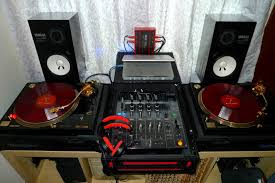 When setting up any type of stage, you have to put forth some effort. Every performance on that stage will have specific needs. The lighting setup for a school play will be different from what may be required for a concert. This complicates things, but only half as much as the setup for a DJ. DJs often travel into areas that are not set up at all and be expected to be great while they are there. This makes setting up the ultimate synthesizer sound show very difficult for DJs.
When setting up any type of stage, you have to put forth some effort. Every performance on that stage will have specific needs. The lighting setup for a school play will be different from what may be required for a concert. This complicates things, but only half as much as the setup for a DJ. DJs often travel into areas that are not set up at all and be expected to be great while they are there. This makes setting up the ultimate synthesizer sound show very difficult for DJs.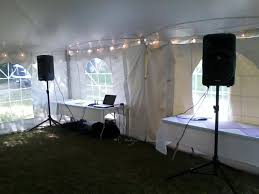 A DJs job goes well beyond playing music. Anyone can play music. They must make sure that it can be heard in all areas of the venue, even if they are outside, and they must make sure that they have lights, a good power supply to power it all, and more. Lights and sound must work together to keep the crowd excited, as if they were at a live concert; by simply playing the tracks that they have available. In short, their job is to turn the music into something memorable.
A DJs job goes well beyond playing music. Anyone can play music. They must make sure that it can be heard in all areas of the venue, even if they are outside, and they must make sure that they have lights, a good power supply to power it all, and more. Lights and sound must work together to keep the crowd excited, as if they were at a live concert; by simply playing the tracks that they have available. In short, their job is to turn the music into something memorable.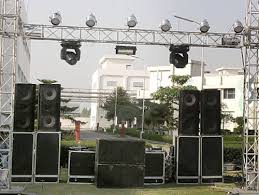 No one hires a DJ just for the sake of hiring one. DJs are at an event because the people who hired them want the event to be memorable. They show up for weddings, business events, birthday parties, and all other large-scale parties. Their “stage” changes with every event. One night, they may be performing inside of a school gymnasium for a dance, and the next night may find them performing at an outdoor wedding reception. They have to be prepared for anything and all of it can be tricky to set up. Inside, lights, smoke makers, and the sound system are easier to setup since they are enclosed spaces. Outside, though, the DJ has a lot of other things to deal with in setting up, especially when it comes to the speakers, since there is no confined area for sounds to bounce off of. If there is a canopy, which most events will have if they are outdoors, the DJ may use outdoor ceiling speakers to ensure that the sound travels well enough to be clear in all areas.
No one hires a DJ just for the sake of hiring one. DJs are at an event because the people who hired them want the event to be memorable. They show up for weddings, business events, birthday parties, and all other large-scale parties. Their “stage” changes with every event. One night, they may be performing inside of a school gymnasium for a dance, and the next night may find them performing at an outdoor wedding reception. They have to be prepared for anything and all of it can be tricky to set up. Inside, lights, smoke makers, and the sound system are easier to setup since they are enclosed spaces. Outside, though, the DJ has a lot of other things to deal with in setting up, especially when it comes to the speakers, since there is no confined area for sounds to bounce off of. If there is a canopy, which most events will have if they are outdoors, the DJ may use outdoor ceiling speakers to ensure that the sound travels well enough to be clear in all areas.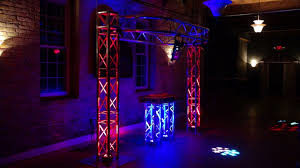 There are a lot of different things that go into setting up a place where performers will take the stage. It requires a great sound system and a lot of lights, especially if you are setting up for an electronic show. Lights and performance is as much a part of the music as the music itself in many “house music” settings where a DJ will be taking center stage. The light setup for shows is crucial when a DJ comes out, because with it, the overall tone of the performance can be set.
There are a lot of different things that go into setting up a place where performers will take the stage. It requires a great sound system and a lot of lights, especially if you are setting up for an electronic show. Lights and performance is as much a part of the music as the music itself in many “house music” settings where a DJ will be taking center stage. The light setup for shows is crucial when a DJ comes out, because with it, the overall tone of the performance can be set.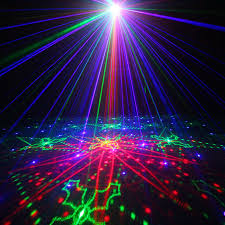 When you go to a club, you may have a DJ instead of a live band. The DJ can use strobe lights to amp people up, soft lights to romanticize the evening for certain songs, and more. At other times, they may use lights to emphasis the smoke that is floating on the floor or use different colors to highlight specific dancers who are truly into the beat at that time. They are a performer who controls a lot of different things at one time. A successful night for them is when the crowd was into their performance and amped up at the right times. The catch is, not all house music is contained in the clubs. There are other venues that play music that must be just as impressive when the DJ walks away at the end of the night.
When you go to a club, you may have a DJ instead of a live band. The DJ can use strobe lights to amp people up, soft lights to romanticize the evening for certain songs, and more. At other times, they may use lights to emphasis the smoke that is floating on the floor or use different colors to highlight specific dancers who are truly into the beat at that time. They are a performer who controls a lot of different things at one time. A successful night for them is when the crowd was into their performance and amped up at the right times. The catch is, not all house music is contained in the clubs. There are other venues that play music that must be just as impressive when the DJ walks away at the end of the night. Most all DJs enjoy being center stage so to speak at times. Whether it is while they are waiting on the next band to hit the stage and complete their own setup or when they simply need put the attention on away from those who are dancing so that they can take care of announcements. When they venture out to a big outdoor performance like the Coachella, they must take further steps to ensure that the G4 Bi Pin lights are set up in the right places so that no area of the “dance floor” is darkened when it does not need to be.
Most all DJs enjoy being center stage so to speak at times. Whether it is while they are waiting on the next band to hit the stage and complete their own setup or when they simply need put the attention on away from those who are dancing so that they can take care of announcements. When they venture out to a big outdoor performance like the Coachella, they must take further steps to ensure that the G4 Bi Pin lights are set up in the right places so that no area of the “dance floor” is darkened when it does not need to be.